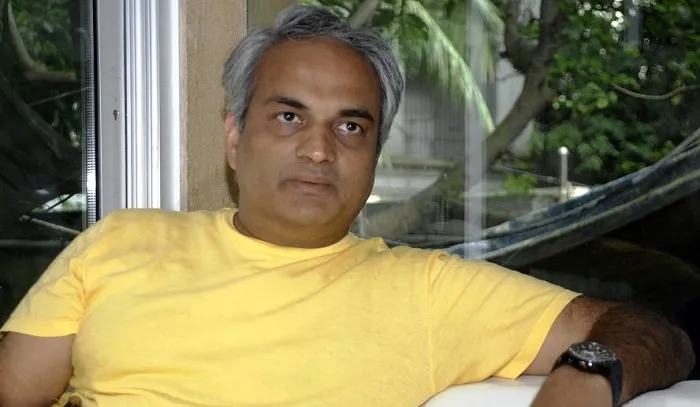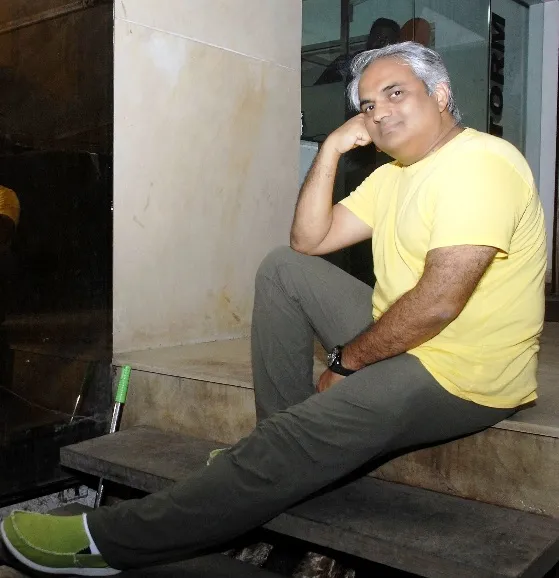Mahesh Murthy, quite naturally
Mahesh Murthy, founding partner, Seedfund, is an entrepreneur, an investor, an evangelist and also a rebel in many ways. He started his defiance as a young lad, when he decided to drop out of college to seek his fortune. Next he defied mainstream advertising to start his agency Pinstorm, which based its revenues entirely on performance and unlike other advertising businesses doesn’t believe the client to be god. We asked him how he managed to garner the large number of followers across social media, and his simple formula was: “by being helpful.”
In an interview that lasted a little over an hour, we bring to you an inside view of one of the most sought after brains in the entrepreneurial space in India, who is also very “helpful”. Excerpts.

From zero to hero
When Mahesh decided to leave college to seek his treasure at the end of the rainbow, he met with no enthusiasm at home. Instead he was thrown out of his house and was left to fend for himself. He set sail with some scholarship money of Rs 3,000 and stayed many nights at a cheap Rs 50 per night hotel in Secunderabad.
To support himself, Mahesh joined Eureka Forbes as a salesman and started selling vaccum cleaners door-to-door. “The monthly income of people at that time was Rs 3,000 and our vaccum cleaners were priced at Rs 3,300. So everyone would ask can you come and clean my carpet for Rs 100 , but Eureka Forbes was not interested in providing services,” recollects Mahesh. So after selling vaccum cleaners for a little over a year, Mahesh and his friend started Vaclean Services doing what the customer wanted. Things were good on the customer side of things. And to expand the scope of their business Mahesh approached hotels whom he identified to have a need for vaccum cleaning services as well. There a hotel owner asked him to show the brochure of the services they offered, but Mahesh didn’t have any. “I did not know what a brochure was and through enquiries I found out that a printer makes brochure,” says Mahesh.
Next he went to a printer and asked him to print brochures, but the printer asked him for the brochure design that had to be printed. Without having anyone to design his brochure, Mahesh got down to doing it himself. And after printing some brochures, Mahesh went back to the hotels with the Vaclean Services brochure, but instead of getting clients for Vaclean, the restaurant owners were more impressed with the design work he had done on the brochure and asked him to design some brochures for them.
Mahesh obliged and make them the brochures. However when it came to billing them for his work and recovering money, things were tough and restaurants didn’t pay him, as he had never raised an invoice or billed them for the work. More lessons and near penury introduced Mahesh to the world of advertising. “I was down to my last Rs 30 and one of my friends told me, if you are doing all this then why not join an advertising agency,” recalls Mahesh. This advice, coupled with desperation made Mahesh move in a direction that was to redefine his life in more ways than one.
Mahesh joined Grey Advertising and then served stints in Ogilvy Hong Kong where he worked on HP, Microsoft, Unilever, The Economist, Pepsi and MTV. Mahesh’s move to CKS partners as the creative director and eventually a partner was his first stint as an entrepreneur. He founded Passionfund in 2000, and since then he has been involved in the creation and exits of many successful startups including USWeb, Compassbox, WebDunia, Geodesic and EBSDirect among others. Today Mahesh divides his time between his advertising interest and startup interest via Pinstorm and Seedfund respectively. And when he is not involved in either of these, he could be in any part of the world, doing what he likes second best – travelling.
Redefining advertising
After working for over a decade in advertising, Mahesh had sweared off the business. And when he returned to India after stint in the US he was sure he would have nothing to do with advertising. “Most advertising agencies earn money through kickbacks. Traditional media makes money from two major sources – kickbacks from media and margins from TV campaigns. Media commission business in India is probably to the tune of about Rs 3000-4000 crores. Its unethical. The way it is done is through volume discounts, credit notes and such. And this is a large source of revenue for many agencies. Some agencies would earn Rs 200-300 crores of revenues this way. So as long as large agencies are surviving on the cocaine of kickbacks, they will never really be able to do digital. In TVC production, there is an undeclared margin of Rs 40-50 lakhs,” reveals Mahesh.
Mahesh also discovered, that nobody was rich in advertising, so his reasons for swearing off advertising was two-fold -- no one could be rich in advertising and that it was unethical. But as luck would have it, he couldn’t stay away from it forever. A chance meeting with an old friend who worked for CRY, made Mahesh explore the space of digital advertising. “CRY was looking to raise money and I told them, why don’t you look at raising money online. My friend said nobody knows them outside India and was not sure what they could do online. So I asked her if she was ok, if I did something and she gave me the go ahead,” reminisces Mahesh. This was the time Google Adwords were just about starting out and Mahesh used the online space to effectively raise $120,000 for the NGO. “In Dec 2003 I got a call from Ingrid who used to head revenues at CRY, and said they got $120,000 in donation and she doesn’t know where it came from and it has come from countries where they had no activity. So I told her online advertising works and she can keep the money,” says Mahesh. But Ingrid was not to let this just be, and she insisted Mahesh did it properly for them as their agency. After many fights and rounds of argument, Mahesh finally agreed to be CRY’s agency on two conditions – that they get to have the complete creative right of approval, and that they will not share their media plan with CRY. So technically, if Mahesh and CRY were to part ways, CRY doesn’t get anything, because what Mahesh had created, he also owned -- as his IP.
With that one client to over a dozen clients today, Pinstorm has managed to successfully do advertising on their principles and delivered effective results to clients such as Cadbury, Airtel, ICICI Bank and Wipro among others.
Mahesh says, he has been approached by bigger agencies and external entities 21 times for a buyout, but he is still waiting for someone to offer that magic figure. “I love what I am doing, and this is profitable. At some point I would like to give the shareholders an exit, maybe we can do an IPO, maybe we can’t. And other agencies have not really given us the value of what we think we are. We’ll carry on working and we’ll find exit for people here, either by going public or something else. The main thing is how long we can keep making a difference. If I get some magical number, yes I can think of selling, but it’s not that I am desperate,” says Mahesh. He points out to other digital agencies who have been acquired by bigger agencies and says he doesn’t see too much work being done by them post acquisition.
On entrepreneurship

Mahesh is very actively involved in all the investments made by Seedfund and Passionfund. He no longer makes investment through Passionfund, but still works with the previous investees there. Mahesh says there is no point in being the No 2 or No 3 in the digital world and most of the investments made by Seedfund has also followed the same principle – be it redBus, Vatsalya, MyDentist or others – each have been the No 1 in what they are doing in the space. And Mahesh is convinced, that is the right approach.
“Entire businesses that have developed in India have developed by copying what has been happening in the West. We either get a license from them to sell it here, or do something similar. But this formula will not work in the digital world. I am not doubting the proof of concept, but what is the differentiating factor, a startup has to be very clear on that,” he offers. Mahesh says VCs are subsiding the market and paying the deficit. “I am happy to be proven wrong. My background is that of a copywriter and how consumers behave, when I don’t get it I will not put money. So far the world seems to be bearing in line with what we have been saying,” says Mahesh.
Having said that, he agrees now is a good time to startup because the environment is very conducive to starting up, there is lot of VC/angel money available. But he says he would like to see more entrepreneurs becoming investors, because a mutual fund guy who becomes an investor or an MBA person who becomes an investor, has no idea how to run a business, says Mahesh.
On the entrepreneurial side, he wishes people would not think of entrepreneurship as an alternative to a career, ‘chalo jaldi paisa bana lenge types’. “The thing about being an entrepreneur is that it takes 10-15 years to become an entrepreneur. It’s not a fashionable thing, ‘main bhi entrepreneur’. It’s a calling – if you do it, you do it all your life. The fact that you are an entrepreneur is itself fashionable, the fact that you are your own boss. Sheer pleasure of being an entrepreneur is worth its weight in gold. What is required from both the sides is more rigour, its hard to be an entrepreneur and hard to be an investor. The people who are good investors are those who have been through it before, gone through hard times. The people become good entrepreneurs are those who have been through hard times and then seen success,” says Mahesh.
Talking about sectors which have the opportunity to still be disrupted, Mahesh thinks every sector has a chance. “You have to be deep embedded in a sector to find the need gap in that sector. There was MySpace, then Orkut came and never took off in the developing world. But when Facebook appeared on scene and said it will not allow account to be opened without verification that tilted the scales. Now Google+ has quietly managed to reach 350 million users by making circles the differentiating factor. Similarly for any new business to come up, they have to be deeply involved in a sector to spot the opportunity,” he suggests.
We ask him if the time taken to build a brand has come down in the online world. Mahesh thinks, that is not the case. 7-8 years is critical for any company and if anyone is selling after 7-8 years, then they could be selling a “half-baked cake into the market.” Having said that, he offers the example of Naukri and JustDial as companies that took their time to grow and get established, before looking for an exit. “There is much greater globalization today, at the same time there is much lesser surety of future revenues. So I can’t predict my revenues two years down the line. Therefore things much more volatile. So while the opportunities are great, the volatility is greater too. The steady stage, less volatile growth that used to happen with companies is kind of over now. Today it is harder to predict, what will happen,” says Mahesh.
preethi@yourstory.in







